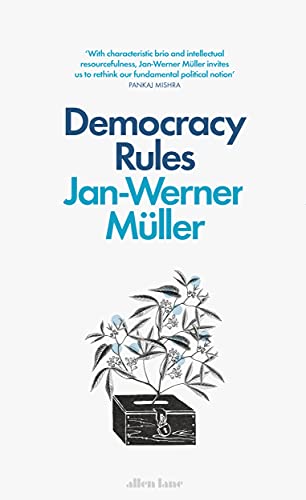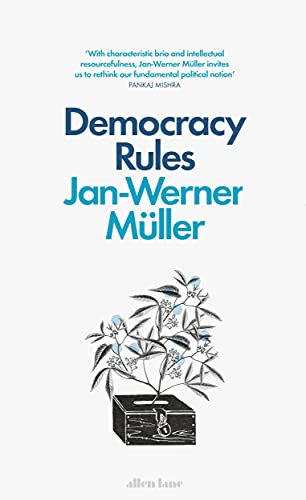Jan-Werner Muller, Democracy Rules


Jan-Werner Muller, Democracy Rules (Farrar, Strauss and Giroux, 2020)
When one considers why so many ostensible democracies, both historical and contemporary, seem so bad at providing citizens the ability to efficiently devise public policies that they actually want or like, a number of possibilities may suggest themselves. Perhaps it is difficult (or even impossible) for many of the residents to vote—or those in power don’t care much what those allowed to vote actually say. Maybe there are no--or insufficient--protections of individual rights. Possibly, the voting mechanisms are deficient in some way: elections might be too infrequent, tally votes in an inappropriate fashion, or fail to touch on the most important issues facing the electorate. Again, the governmental structure might be inefficient or otherwise ungainly: e.g., maybe it’s claimed that it should be run by a President rather than a Prime Minister (or vice-versa). Alternatively, it could be complained that “big money” or “big corporations” have undue influence on policy or who gets elected. Or it may be alleged that the citizenry is simply too stupid, too evil or too misinformed to participate in an effective democracy; and this complaint may be connected with some view regarding excessive or deficient levels of this or that type of technology in the jurisdiction. Naturally, these items are not mutually exclusive, and the list isn’t meant to be exhaustive: there are a number of other suspects that have been offered up by scholars and pundits that will be familiar to the readers of this review. No doubt many of these proposals are intuitive to some degree, but the number and diversity of them, as well as the difficulty in piecing them together into a coherent whole, may leave students of democracy in a state of confused despair.
This book may help. Inquiring into the problems of and possible solutions for democracy by reading Jan-Werner Muller’s deep and elegant Democracy Rules is like getting a chance to discuss all the most important issues surrounding democratic theory with a patient sage. While Muller is too cautious and knowledgeable to accept the first couple of ideas that may suggest themselves, he doesn’t shy away from answering the hardest questions with thoughtful, comprehensive answers. Perhaps the best example of this is the intriguing facet he proffers as the key missing element in failed or floundering attempts at self-government: the ex-ante uncertainty of upcoming electoral results. Of course, such assurance may have many causes—money, gerrymanders, electoral rules, election rigging, citizen indifference, control of the media, etc. But Muller’s point is that what generally seems to be wanting in faulty democracies (just as they obviously are in blatant autocracies) are authentic plebiscitary contests, those where the results are not forgone conclusions. And, sadly, the few polities (or regions within them) that retain this desired uncertainty are likely to be under constant attack by would-be despots or their gerrymandering backers, and so be themselves in danger of extinction wherever they do happen to be found. What matters is that where the outcomes of elections are regularly without interest, it is stretch to dub the jurisdiction an authentic, rather than sham, democracy.
Muller deduces from the requirement of uncertainty that democracies can flourish only where each adversarial group in the polity is willing to lose, at least occasionally. For wherever those with a desire to ensure permanent victory for a specific group have success in arranging matters, democracy is basically dead—however many elections or apparently deliberative legislative sessions may be held there and how many apparent protections are provided for individual rights and liberties.
Both surface and depth explanations are given for this primacy of uncertainty. It will be unsurprising to hear that where Party X always defeats Party Y the sort of democracy prevailing will be…at the very least…frail. But it may be responded that there is no essential problem with results of that nature if the people in the jurisdiction really do always want what they are getting. Muller, however, connects the absence of real contests with what is often taken to be the single most important criterion of democracy: the equal treatment of every person. This seems to him to follow because where one group always wins it is likely that those with opposing views are not seen as legitimate persons. He believes that the prevailing view in such polities must be (or will become) something like this: “[A]ll other contenders for office are fundamentally illegitimate. [And] the suggestion that there is a ‘real people’ implies that there are some who are not quite real—folks who just pretend to belong, who might actually undermine the polity in some form, or who at best are second-rate citizens.” Thus, if a jurisdiction comes to be so arranged that only those with a specific set of views ever get to run the place, it is quite likely that equal treatment is not really obtaining.
It might be objected here that being unloved by xenophobic or anti-science electorates, as the regularly successful voters in various right-wing autocracies are often claimed to be, need not be like being black or of some unpopular ethnicity. After all, while one cannot change one’s race or personal history, one can certainly change one’s views and so become part of this xenophobic, anti-science majority. But Muller recognizes that if we position what he calls the “hard borders” of democracy only in such places where such identity characteristics as race are protected, what look like citizen safeguards may be a sham. Policies may begin to proliferate that allow majorities to less openly—but still successfully—discriminate against groups that they don’t care for. So if the goal is to keep Muslims out of a country, this may be done without explicit mention of religion or country of origin in any law, regulation or policy. The xenophobia might be disguised, for example, under a bogus anti-terrorist provision, or government patronage may just never go to certain groups.
Nearly all recent—or indeed ancient—books on democracy can be expected to include material offering both necessary and sufficient conditions for deeming a polity democratic, and to proceed from there to assess the democratic credentials of various contemporary and historical states. But it is often hard to find any essential quality proffered as interesting as Muller’s uncertainty condition. There may also be an absence (as there certainly is in my own book on democratic theory) of sustained analysis or evaluation of “intermediary institutions” (what Muller sometimes calls democracy’s “infrastructure”) and their role in keeping democracies alive. For Muller, these intermediaries include political parties and influential media organizations. (He also mentions political subdivisions, but doesn’t focus nearly as much discussion on them.) I believe he is correct about the importance of these two sets of institutions, but, of course, getting either parties or media organizations to do what real democrats want them to do is notoriously difficult, particularly, one might hold, in societies where money is nearly always the most important motivator. Several previous Hornbook reviews have been devoted to works precisely focused either on parties—and the extent to which the Schattschneider (“responsible party”) view of what they should be doing has been helpful or destructive—or on media platforms—and how they might be encouraged to tell the truth, the whole truth, and nothing but the truth. These are terribly knotty issues to be sure. How has Muller moved the needle?
Without engaging in a lengthy summary of the entire work, it is impossible to broach all that this book offers regarding the current deficiencies both of political parties and of the gigantic media entities so often engaged in the purveying of falsities. Neither can I run through his diagnoses of the causes of these deficiencies or the array of possible cures he has suggested for them. I will instead simply itemize a few of his proposals. He suggests the limited integration of sortition and other democratic reforms into party organizations themselves to allay their own regular lack of the beneficial property of uncertainty. In doing this, he seems to me to take the somewhat Ecksteinish view that intermediary organizations must themselves be democratic if they are to have any democratizing effect on the polities where they are found. And he reasonably believes where these intermediaries are themselves undemocratic, one should not expect the jurisdiction to do better. Muller shares my skepticism regarding concerns over “mobocracy,” which are often exaggerated by epistocrats, and, because he trusts the “regular folk” to make their own decisions, he supports the wide distribution by governments of “democracy dollars” that can be used by individual voters to support candidates, something that has been implemented in Seattle, Washington. He worries about subtle, gradual, and often hard to quantify moves toward despotism stemming from government influence over courts and big media of the sort that have been seen in Hungary, and suggests the (to me, somewhat obscure) proposal, taken from the work of French economist Julia Cagé, to provide a “much needed boost to journalistic upstarts” through the creation of “non-profit media organizations that would combine the advantages of joint-stock companies and private foundations.” (I complained recently of the otherwise excellent book by Rick Hasen that the solutions he offered to the debasement of American democracy seemed grossly insufficient for the daunting tasks required of them. Here, my only reservation is that I may not fully understand all of the proposals Muller makes for shoring up journalistic integrity. But, in spite of this hesitancy on my part, I (perhaps strangely) retain the sense that if all that Muller proposes here could be implemented, the improvements he advocates might really arise. They are, at any rate, clearly bold and aimed at the actual problems rather than fighting back with nothing but pop-gun shots.
Those having familiarity with my own recent work on democratic theory may note the congeniality of Muller’s book with much of my own writing on the subject; e.g., here, here, and here. But the differences in scope and style, which surely redound to Muller’s credit, may also be quite noticeable. Yes, we agree that the benefits of sortition are limited and that various criticisms of more traditional majoritarianism have been overblown. We both exalt democracy in a manner that shows less (official, if not personal) concern than many other commentators regarding the particular (i.e., left/right) political results that authentic democracy might foist on their jurisdictions. But it is also the case that I am much more parochial—my general ignorance of world politics and various corners of political science have forced me to concentrate on the U.S. and to do so in what may be considered a somewhat old-fashioned analytical manner. Muller, in contrast, is equally comfortable discussing current populist movements in Iceland, Brazil, Syria, Netherlands, ancient Athens--pretty much everywhere--and he does so in a way that nearly any interested reader can enjoy. Again, where we both may have a comment or two to make on Rousseau, Madison, or Kelsen, Muller can also reach back to the pre-Socratics, as well as offer compelling insights on Bolsanaro, Arendt, and Grillo or the effects of changes in party structure on a recent election in Israel.
In sum, Democracy Rules is a magisterial work on political theory by an author of depth, brilliance, and wide scholarship. But, somewhat amazingly, it is also a book that, unlike, say, Hobbes’ Leviathan or Rawls’ Theory of Justice, is easily approachable by anyone with a general interest in politics. I recommend it highly.

About the Author
Walter Horn is a philosopher of politics and epistemology.
His 3:16 interview is here.